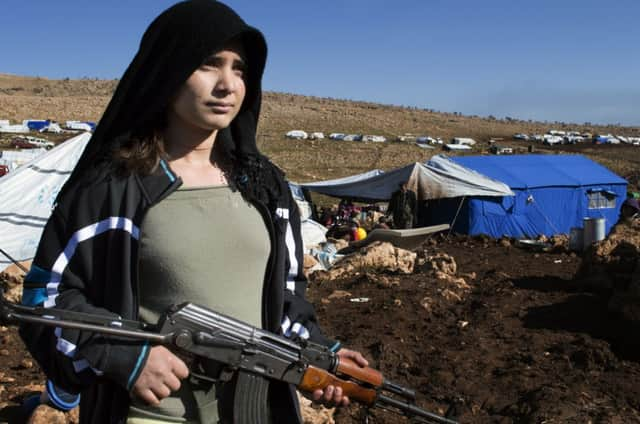Life as a resistance fighter for Sinjar carpenter


Six months ago he lived a normal life working as a carpenter in his hometown of Sinjar, but when Islamic State (IS) militants advanced on the Yazidi city in northern Iraq, he and thousands of others were forced to flee, leaving any semblance of normality behind.
Naif, along with 700 others, is now a fighting member of the Sinjar Resistance Units (YBS), a new militia founded on Mount Sinjar by the Yazidi population, an ancient ethnic and religious group whose roots in Sinjar date back 4,000 years.
Advertisement
Hide AdAdvertisement
Hide Ad“I’ve been fighting here in Sinjar for around six months now,” Naif told Scotland on Sunday. “I am staying here and it’s my honour. Every Yazidi has this responsibility to come fight for this land.”
Naif and 10,000 Yazidis remain in makeshift tented communities on the top of the mountain; water and food is hard to come by, sanitation limited.
One route exists off the mountain – a trek to the west through bombed out towns, potential improvised explosive devices, and shifting front lines, into civil-war torn Syria.
An estimated 300,000 people fled Sinjar and the surrounding area when IS advanced on 3 August – an attack on the Yazidi community that the United Nations later defined as an attempted genocide. Naif and his family remain camped on Mount Sinjar, refusing to leave their homeland despite looking down on swathes of IS-controlled territory below.
With Iraqi Kurdish Peshmerga forces withdrawing from Sinjar when IS militants first advanced, the Yazidis were left defenceless. Naif and other young men and women that fled to the mountain started to organise, they armed themselves and set up defensive positions. Their aim was to stop the extremists taking the mountain top – the only refuge, and way out, for the fleeing thousands.
“I am so proud of what I’m doing here,” Naif said. “I don’t care about the people who fled the city – I didn’t have a feeling to do that, I couldn’t run. My feeling was to fight and that’s what I’m doing.”
Said Hassan Said, a leader of the YBS, told Scotland on Sunday that from those first volunteers, with the assistance of the Syrian Kurdish Peoples Protection Unit fighters who came to their aid at the beginning of the crisis, the YBS was born.
Although Said said he can understand why the Peshmerga fled initially, he vowed never to allow his people to experience such helplessness again. “When Islamic State came, the Peshmerga left us,” Said said bluntly. “Because they [Peshmerga] have families too, and these people in the Peshmerga for them, it’s a job. They’re coming to make money, they aren’t coming to fight. Sinjar wasn’t their fight.”
Advertisement
Hide AdAdvertisement
Hide AdAfter months of destruction, they are now looking to the future. And today Mount Sinjar is protected. When not actively fighting in the city below, YBS militants are on patrol, circulating between the mud-caked refugee-style tents in dark green military fatigues, fully automatic machine guns, grenades and extra ammunitions strapped to their abdomens. It’s a jarring site in what otherwise would seem like a typical refugee camp.
Hannah Elyas, a 19-year-old from Sinjar City, wanders the camp, dodging between the UNHCR tents and running children, a loaded Kalashnikov balanced with precision as she manoeuvres. Elyas was a student, now she spends her days in brutal street battles with IS, on the same streets that she and her friends used to walk to and from classes
“I feel so sad to see my city on fire like this, with houses being bombed all over,” she said. “But even if I am the last one here, I will fight until I die. I will not go out and die outside of my city. I will die for Sinjar.”
Elyas joined the YBS in October. The decision for her, she said, was an easy one. “I can’t explain what it feels like, to pick up a gun to protect my country. It’s an amazing feeling, and any person would do it, especially the Yazidi people.”